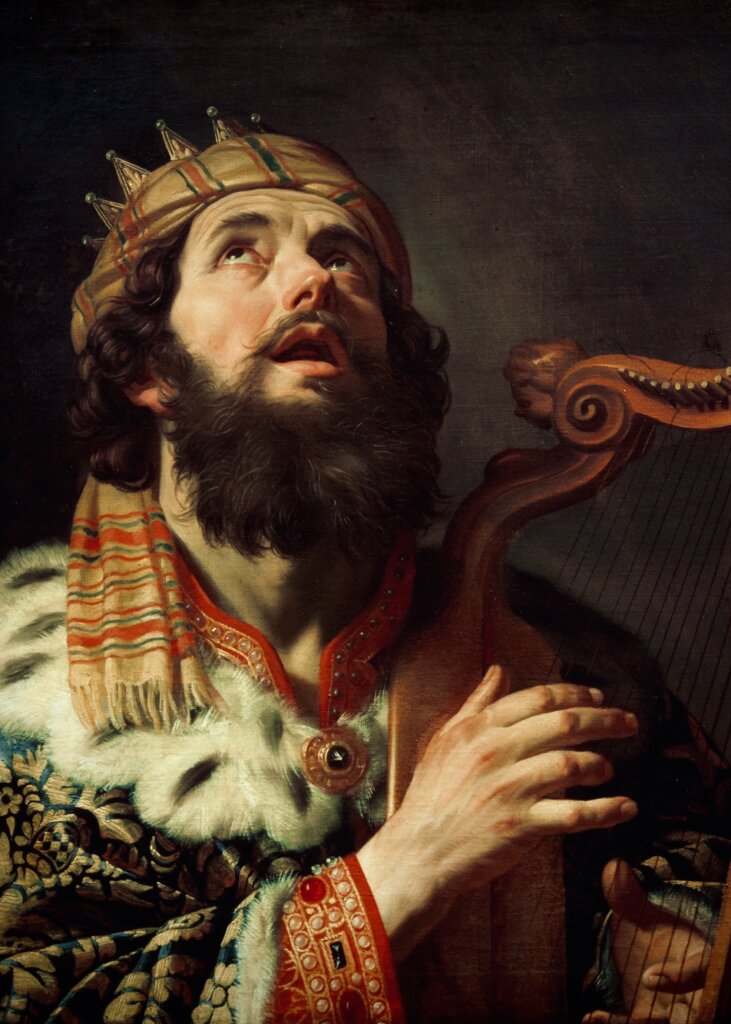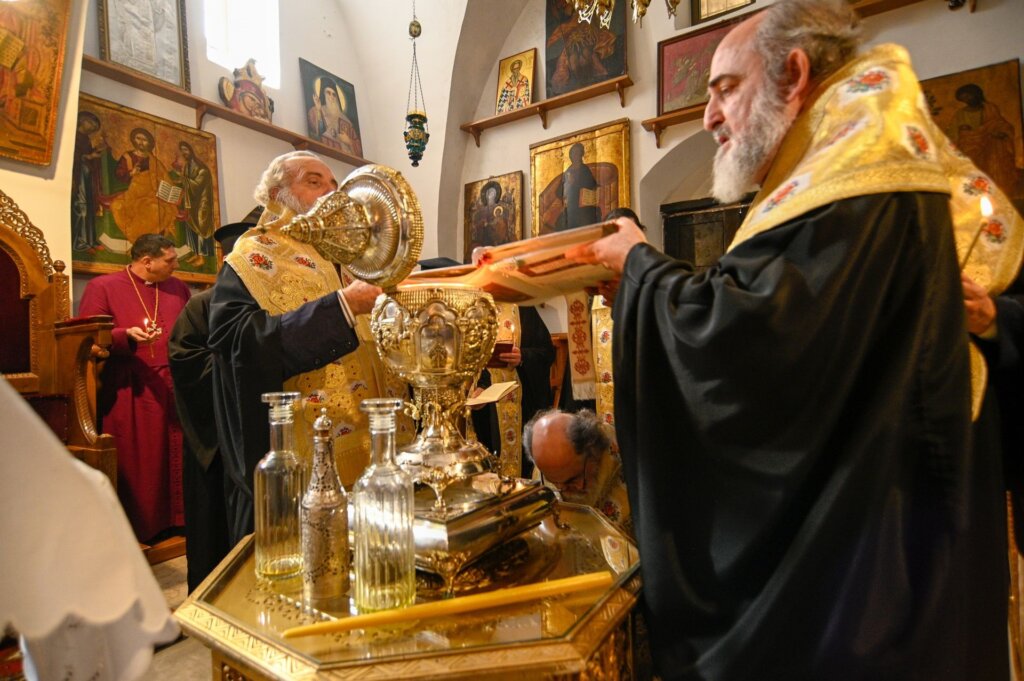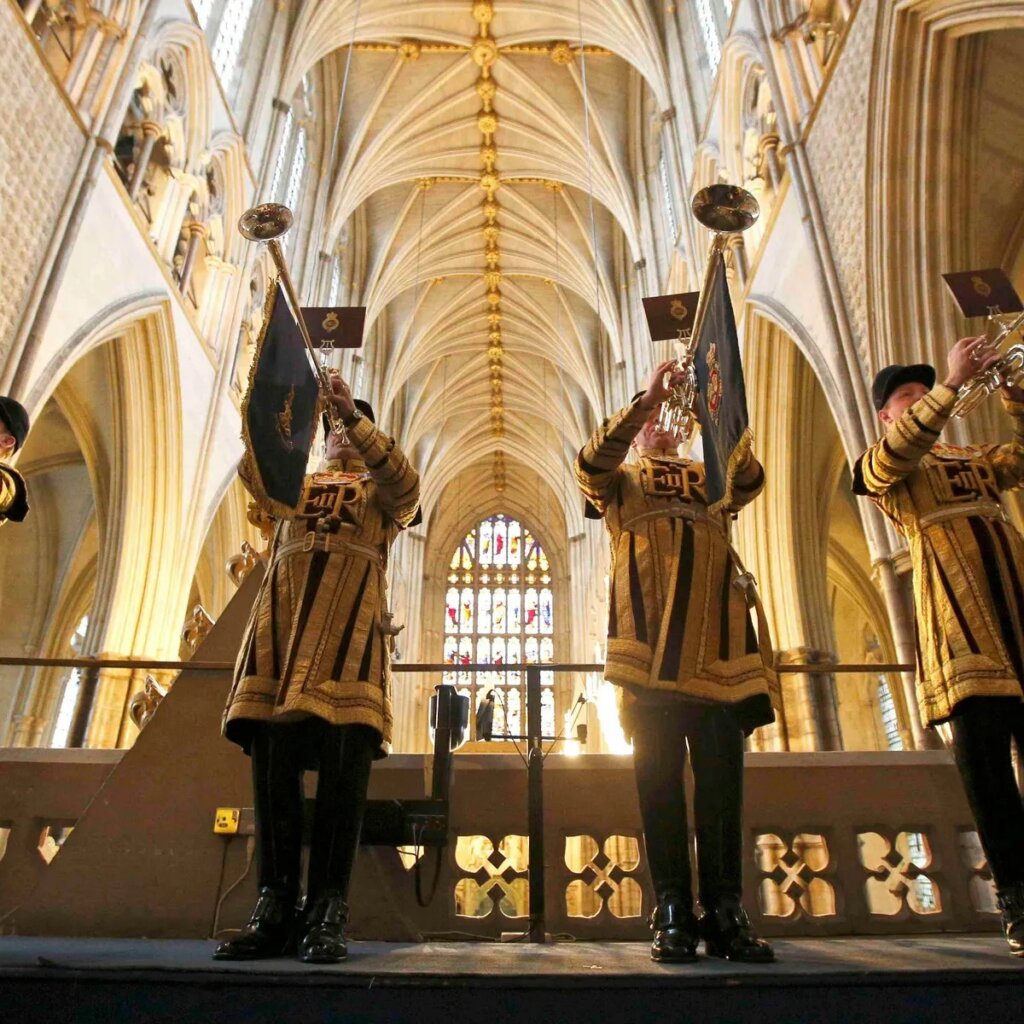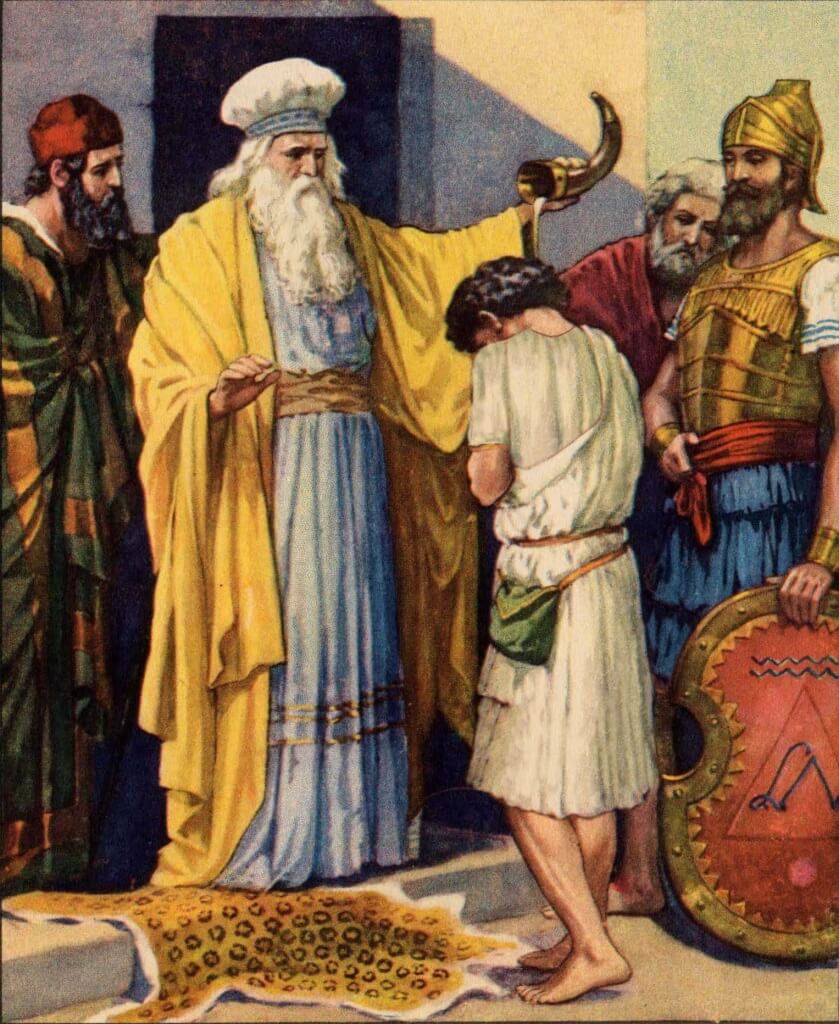King of Israel and All the Earth!
By: David Parsons, Vice President & Senior Spokesman
Our Feast theme this year is taken from Psalm 47:7… “For God is the King of all the earth.”
This speaks of the Creator God who rules over all He has made, even those who do not acknowledge His existence. He reigns supreme over all things, which were made for His enjoyment and splendour. “Thou art worthy, O Lord, to receive glory and honour and power: for thou hast created all things, and for thy pleasure they are and were created.” (Revelation 4:11 / KJV)

When we consider earthly kings, we often think of sovereignty – the right and authority to rule over a people. Do they have sole, absolute authority or is it limited by some compact with the king’s subjects? Hopefully, he is a benevolent monarch. And those with victorious armies, grand palaces and immense wealth often leave a lasting legacy.
Yet of all the kings in human history, none stand out quite like King David. Under his rule, the Kingdom of Israel took on a glory and fame that resonates to this day. Of course, his son Solomon only added to that majestic aura when he built the Temple in Jerusalem, transforming it into a city of universal significance and acclaim.
Even today, kings do not look to the Egyptian pharaohs and Roman emperors of the past as their models for emulation. They look to King David!
We witnessed this in the recent coronation of King Charles III in Great Britain. Whatever one thinks of Charles’ character and globalist agenda, it was astonishing to watch his traditional coronation ceremony in Westminster Abbey infused with so many powerful passages from Scripture and so much symbolism from the Davidic line. For instance:

>> Charles was anointed with a special oil from the Mount of Olives scented with spices from the Holy Land, much like David was anointed by Samuel (1 Samuel 16:13) and Solomon by Zadok (1 Kings 1:39).
>> Trumpets were blown in the Abbey just like when Solomon was crowned as king according to the instructions of David, who also gave us the phrase “God save the king” (1 Kings 1:34).
>> Charles was handed a “sceptre of equity”, reminiscent of Israel’s kings (see Psalm 45:6).
>> Finally, he sat on an old wooden throne which rested on the “Stone of Scone” (or “Destiny”), which Scottish legend claims was the rock where Jacob laid his head and dreamed of a ladder to heaven (Genesis 28:10-12) and where Davidic kings later sat when crowned.

Whether that legend is true or not, the main takeaway here is that the monarchs of Britain and most other European thrones have all historically looked to the royal House of David as the highest and purest example of a God-ordained king. And the Christian themes and symbols present in these European coronations over the centuries are rooted in the belief that Christ is the rightful heir to the throne of David.
Yet the fact that King David would be the forerunner and prototype of the Messiah is something of an enigma. This is because God made clear to ancient Israel that He was their King, and thus they had no need of an earthly king.
As my colleague Dr. Jürgen Bühler pointed out in the last issue of the Word From Jerusalem magazine, when God brought Israel out of Egypt, He called them to be “a kingdom of priests and a holy nation” (Exodus 19:6). And God Himself became their “King in Jeshurun” (Deuteronomy 33:5). For He alone was worthy to rule and reign and give direction to this people.
Yet later, Israel insisted on having an earthly king like the other nations around them, a demand which sorely displeased God. It happened under the prophet Samuel, who complained to the Lord and received this reply: “Heed the voice of the people in all that they say to you; for they have not rejected you, but they have rejected Me, that I should not reign over them.” (1 Samuel 8:6-7)
So how could God go from forbidding Israel an earthly king to allowing one? And how was this earthly king suddenly elevated to being the progenitor of the King Messiah; that is, Jesus, both the Son of David and Son of God!
Flawed Kings, but a Faithful God
To unlock this riddle, it first must be noted that the people were demanding a king most likely out of fear that what happened under Eli the priest would occur again once Samuel was gone. If you recall, Eli had not disciplined his sons, who were robbing the people at Shiloh, and God sent such a harsh judgment and defeat that the ark of the covenant wound up in the hands of the Philistines. Now, an aging Samuel had just appointed his two sons as judges, and they too were not corrected for their corruption, just like the sons of Eli, causing the Israelites to fear what might lie ahead (1 Samuel 8:1-3). So, they actually had a legitimate cause to be concerned.
Second, God already knew Israel would demand a king long before they actually did so (Deuteronomy 28:36), and He had pre-emptively set out certain rules and restrictions for these kings in the Law of Moses. We find these in Deuteronomy 17:14-20, which instruct the Israelites to make sure to select a king of God’s choosing; one who would not enrich himself by demanding their gold and silver and livestock, and taking their daughters as wives; one who would fear the Lord and keep His word.
So when Samuel faced the mob demanding a king, the Lord permitted it but told the prophet to sternly warn the people concerning the kind of ruler they were about to get. “Now therefore, heed their voice. However, you shall solemnly forewarn them, and show them the behaviour of the king who will reign over them.” (1 Samuel 8:9)
So, Samuel spelled it out clearly, that these kings would surely turn their sons into his servants and soldiers, take their daughters as his cooks and concubines, and heavily tax their crops and livestock. And if they came complaining to the Lord about it, He would not hear them (1 Samuel 8:10-18).
Then when Samuel coronated Saul as Israel’s first king, he prayed for the Lord to give the people a sign they indeed had committed an error, and the Lord answered by sending rain and thunder in the time of the wheat harvest, which is normally a dry season. Yet Samuel also assured the people that God would remain by their side, saying: “Do not fear. You have done all this wickedness; yet do not turn aside from following the Lord, but serve the Lord with all your heart… For the Lord will not forsake His people, for His great name’s sake, because it has pleased the Lord to make you His people.” (1 Samuel 12:20, 22)
In truth, God has always promised that He would never abandon His people. “Behold, I am with you and will keep you wherever you go, and will bring you back to this land. For I will not leave you until I have done what I have promised you.” (Genesis 28:15) “And I will dwell among the children of Israel and will not forsake My people Israel.” (1 Kings 6:13) “For the Lord will not forsake His people; He will not abandon His heritage.” (Psalm 94:14)
Therefore, we can conclude that God had not changed His mind about Israel, but rather He knew they would one day demand an earthly king. It was just a difficult moment to go through for the Lord and for the prophet Samuel given the sense of rejection they both felt.
The Path to Royal Priesthood
Finally, it is fascinating to note a clear pattern in the changing modes of leadership which ancient Israel went through. For roughly their first 400 years they were led by Patriarchs, from Abraham to Moses. Then for the next 400 years they were ruled by Judges, from Joshua to Samuel. After that came 400 years of rule under the kings of Israel and Judah, from Saul and David to Josiah, the last upright king in the Davidic line. Finally, over the next 400 years Israel was basically ruled by a royal priesthood.
We can see Israel’s priestly role coming to the fore as they returned from the Babylonian exile and Joshua the high priest was anointed to rule the people. This key moment of transition for Israel is recounted in Zechariah chapter 3. If the Jews returning from exile had placed a king over themselves, their Persian overlords would have been upset. So to play it safe, they appointed Joshua the high priest as their head.
Remarkably, God sent a prophetic word through Zechariah endorsing this move. Why? Because “My servant the Branch” is coming to “remove the iniquity of that land in one day” (Zechariah 3:8-9). Thus, Israel was essentially ruled by a royal priesthood so that, in due time, they might offer up the sacrifice Lamb for the sins of the world.
In all this, we can see God’s redemptive plan for the whole world playing out in Israel’s journey down through time under different forms of rulership. The Patriarchs received God’s sworn covenant promises to bless and redeem the world through their descendants. The Judges helped possess the Promised Land where redemption would play out. King David was promised a son who would one day rule over an eternal kingdom, and he became the precursor for the King Messiah and the envy of all earthly kings ever since. And that promised Son of David gave himself up as a sacrifice for the sins of the world, thereby earning what was already rightfully his, the eternal throne of David, from where He will rule over Israel and all the earth forever.
This Soon Coming King
With all this in mind, it is encouraging to consider all the prophetic passages still awaiting ultimate fulfilment concerning this most worthy Son of David, who is the “Desire of all Nations” (Haggai 2:7) and “King of all the Earth”.
For instance, the prophet Hosea speaks of a long season when Israel would have neither kings nor priests, but one day that would change. “For the children of Israel shall abide many days without king or prince, without sacrifice or sacred pillar, without ephod or teraphim. Afterward the children of Israel shall return and seek the Lord their God and David their king. They shall fear the Lord and His goodness in the latter days.” (Hosea 3:4-5)
Note here that the prophet is speaking well after King David was dead and buried, which means he is clearly referring to the King Messiah to come. And the promise is that Israel will not only accept this Messiah but earnestly seek Him.
The prophet Isaiah speaks of the everlasting nature of Messiah’s kingdom: “Of the increase of His government and peace there will be no end, upon the throne of David and over His kingdom, to order it and establish it with judgment and justice from that time forward, even forever. The zeal of the Lord of hosts will perform this.” (Isaiah 9:7)
Jeremiah speaks of His righteous rule: “I will raise to David a Branch of righteousness; A King shall reign and prosper, and execute judgment and righteousness in the earth.” (Jeremiah 23:5)
Elsewhere, Jeremiah assures that Israel will serve this Messiah: “But they shall serve the Lord their God, and David their king, whom I will raise up for them.” (Jeremiah 30:9) Again, in the days of Jeremiah’s prophetic ministry, David was already in his grave, so this is speaking of the King Messiah.

Another incredible prophetic vision came through Ezekiel, at a time when the kingdoms of Israel and Judah were bitterly divided, at war with each other, and hopelessly headed for exile. Yet the Lord vows that one day: “Surely I will take the children of Israel from among the nations, wherever they have gone, and will gather them from every side and bring them into their own land; and I will make them one nation in the land, on the mountains of Israel; and one king shall be king over them all; they shall no longer be two nations, nor shall they ever be divided into two kingdoms again… David My servant shall be king over them, and they shall all have one shepherd; they shall also walk in My judgments and observe My statutes, and do them… and My servant David shall be their prince forever.” (Ezekiel 37:21-25)
Finally, the prophet Zechariah foresees the day when “the Lord shall be King over all the earth” (Zechariah 14:9). He also sees a vision of the nations flocking to Jerusalem “to worship the King, the Lord of hosts, and to keep the Feast of Tabernacles” (Zechariah 14:16).
This is your invitation, straight from the pages of Scripture, to come worship King Jesus at this year’s Feast. There is no better way to prepare your heart to receive Him at His soon coming!
Find out more about the Feast and register today at: feast.icej.org